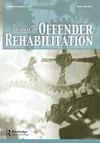评估同时存在阿片类药物使用和精神健康问题的被监禁者的重返社会需求
IF 1.1
Q3 SOCIAL WORK
引用次数: 0
摘要
摘要同时存在精神健康问题和阿片类药物使用障碍(COD)的个体在释放后死亡率高,社会和健康结果差,有必要更好地了解这一人群独特的再入需求。COD患者所经历的高水平需求表明,有必要提供全面的重返社会支持,包括心理健康治疗、阿片类药物使用障碍药物治疗、教育、就业、医疗补助和住房等社会服务。该样本包括490名成年人,他们来自一个针对中西部州经历COD的个人的目标监狱/监狱再入计划。项目参与者有创伤史(90%),无家可归史(62%),住院精神病治疗史(38%)。此外,大多数参与者报告在基线时因身体问题需要就医(70%)。最后,参与者有广泛的刑事法律系统接触,平均有10次目前监禁之外的终身逮捕(M = 9.91, SD = 8.74)。研究结果对扩大再就业服务以支持COD患者具有重要意义。这包括需要在释放之前开始服务,并确保与社区治疗提供者协调和持续提供护理。关键词:精神健康药物使用者戒毒计划发生性障碍刑事司法披露声明作者未报告潜在的利益冲突。资助密歇根州卫生与人类服务部州阿片类药物反应ii -密歇根州远程医疗评估[赞助商资助号:E20221673-00]。联邦奖识别号:H79TI083298]。本文章由计算机程序翻译,如有差异,请以英文原文为准。
Assessing the reentry needs of incarcerated individuals with co-occurring opioid use and mental health concerns
AbstractIndividuals with co-occurring mental health concerns and opioid use disorder (COD) are at high risk of mortality and poor social and health outcomes upon release, and there is a need to better understand the unique reentry needs of this population. The high level of need experienced by individuals with COD will demonstrate a necessity for comprehensive reentry support which includes mental health treatment, Medications for Opioid Use Disorder (MOUD), social services such as education, employment, Medicaid, and housing. This sample included 490 adults from a targeted jail/prison reentry program for individuals experiencing COD in a Midwestern state. Program participants had histories of trauma (90%), homelessness (62%), and inpatient psychiatric care (38%). Further, most participants reported needing medical attention for a physical problem (70%) at baseline. Finally, participants had extensive criminal-legal system exposures, with an average of 10 lifetime arrests outside of their current incarceration (M = 9.91, SD = 8.74). The findings have important implications for expanding reentry services to support individuals with COD. This includes the need to begin services prior to release and ensuring the coordination and continuity of care with community-based treatment providers.Keywords: mental healthsubstance usereentry programsco-occurring disordercriminal justice Disclosure statementNo potential conflict of interest was reported by the author(s).Additional informationFundingState of Michigan Dept of Health & Human Services State Opioid Response II—Michigan Telehealth Evaluation [Sponsor grant number: E20221673-00. Federal Award Identification No: H79TI083298].
求助全文
通过发布文献求助,成功后即可免费获取论文全文。
去求助
来源期刊

Journal of Offender Rehabilitation
SOCIAL WORK-
CiteScore
1.60
自引率
0.00%
发文量
24
期刊介绍:
The Journal of Offender Rehabilitation is a multidisciplinary journal of innovation in research, services and programs in criminal justice and corrections. The journal is an essential professional resource for practitioners, educators and researchers who work with individuals involved in the criminal justice system and study the dynamics of rehabilitation and individual and system change. Original research using qualitative or quantitative methodology, theoretical discussions, evaluations of program outcomes, and state of the science reviews will be considered.
 求助内容:
求助内容: 应助结果提醒方式:
应助结果提醒方式:


